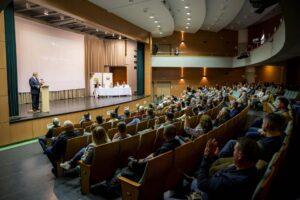A more modern, efficient and sustainable agriculture is being built
Hungarian agriculture is not only the mainstay of our economy, but also the sustaining force of rural communities. The opportunities inherent in agriculture and government support play a key role in ensuring that young people stay local and that agriculture remains sustainable and competitive – stated State Secretary András Tállai at the Agricultural Forum organized by the National Chamber of Agriculture in Miskolc.

(Photo: AM)
The State Secretary drew attention to the fact that, thanks to the Common Agricultural Policy of the European Union, Hungary will receive nearly 3,100 billion forints in support in the period 2023–2027. By March 2025, the Ministry of Agriculture had already published 37 calls for proposals, with a budget of 1,384 billion forints.
András Tállai emphasized that the government’s goal is to create a fairer, greener and more competitive agriculture, with special attention to small and medium-sized farms.
“Young farmers can apply for up to 75 million forints of support with an intensity of 70%. In the case of small farms, up to 10 million forints of support is available with an intensity of 85%, while up to 200 million forints of funding can be requested for plant developments that also use renewable energy,” added the State Secretary for Food Economy and Agricultural Vocational Training at the Ministry of Agriculture. He also highlighted the importance of developing irrigation infrastructure, as the spread of water-saving farming methods has become essential due to climate change. So far, around 1,200 water management projects have been supported, which has increased the size of the irrigated area by 32,000 hectares. The agricultural sector faces many challenges, but – as he put it – the new support system and continuous developments provide an opportunity for farmers not only to survive these periods, but also to emerge from them stronger. Simplifying and accelerating the payments of agricultural subsidies is also a priority, as is encouraging the use of sustainable farming practices and innovative technologies. “The transformation of Hungarian agriculture does not mean weakening, but development. We are building a more modern, efficient and sustainable agriculture – for the benefit of Hungarian farmers, rural communities and the future of the nation,” concluded András Tállai.
AM
Related news
NAK President: more than 120 thousand people signed the agricultural petition in one month
🎧 Hallgasd a cikket: Lejátszás Szünet Folytatás Leállítás Nyelv: Auto…
Read more >János Lázár: rural development is needed, not agricultural policy
🎧 Hallgasd a cikket: Lejátszás Szünet Folytatás Leállítás Nyelv: Auto…
Read more >Related news
GDP growth in OECD member countries slowed to 0.3 percent in the last quarter of last year
🎧 Hallgasd a cikket: Lejátszás Szünet Folytatás Leállítás Nyelv: Auto…
Read more >Change in Rossmann Hungary’s leadership: Kornél Németh decided to move towards new challenges in 2026
🎧 Hallgasd a cikket: Lejátszás Szünet Folytatás Leállítás Nyelv: Auto…
Read more >









